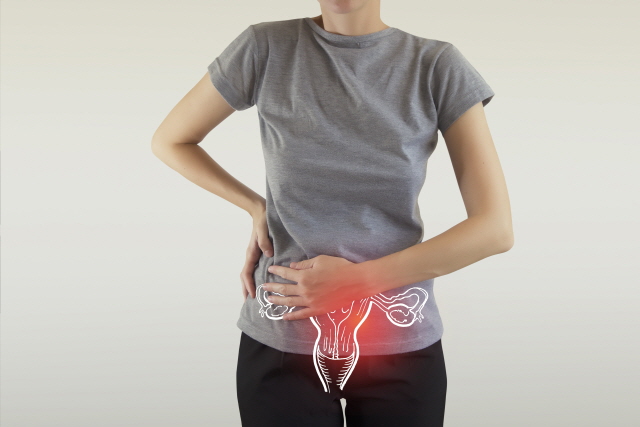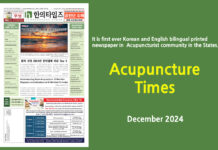
A differential diagnosis should be considered for arrhythmia and infertility cases.
By Joobong Kang, KMD
Action and Diagnosis
Here, the word jing (經) in Wenjing-Tang (溫經湯) does not mean a channel (經). It is the uterus. Therefore, wenjing (溫經) should be understood as warming the uterus.
From the perspective of the organs and channels, Wenjing-Tang treats the coldness and blood stagnation of the uterus due to the lack of qi and blood in Chong-Mai and Ren-Mai. This prescription improves women’s abdominal coldness or limb coldness, menstrual irregularities, bloating and discomfort in the lower abdomen, uterine bleeding, prolapse of the uterus, infertility, asthma, and dermatosclerosis.
In addition, Wenjing-Tang is a prescription of a structure-added drug with blood-nourishing and blood circulation-promoting to Zhigancao-Tang, which treats arrhythmia. So this has a good effect also in arrhythmia, intermittent pulse, and atrial fibrillation in both men and women who lack qi and blood.
The Chung-Mai and Ren-Mai begin at the uterus, through the middle of the spinal column, follow the abdomen as the channel comes outside, passes through the throat and reaches the mouth and lips. Chong-Mai is also known as the sea of the blood, and when the lesion occurs, the qi of the chest and abdomen reverses, resulting in symptoms such as vexed heat, infertility, flaccidity syndrome, and asthma. Ren-Mai begins with the lower abdomen, follows the interior abdomen, goes through the dan-tian, and enters the eye through the throat. Seven-shan occurs in men in the abdomen when a lesion occurs in Ren-Mai; in women, discharge from the women, lumps in the abdomen, etc. That is, the legion of these two qi-jing is almost identical to the treatment content of Wenjing-Tang.
Among the constituent drugs, Guizhi (intercept) and Wuzhuyu (sewage oil) are monarch drugs. Guizhi promotes chest yang, warms yang, and activates the circulation of the whole body’s qi and blood. Therefore, it restores coldness of the waist and legs, abdominal deficiency-cold, and menstrual obstruction caused by blood-coldness. Wuzhuyu has powers of regulating-qi, warming the middle energizer so that it improves the symptoms such as vomiting and diarrhea due to organs coldness, abdominal dropsy, and abdominal pain accompanied by difficulty in urination and defecation; in addition, this relieves abdominal pain caused by cold-phlegm and rebellious-qi caused by the disease of chong-mai. Danggui, Chuanxion, Shaoyao, and Ejiao are minister drugs that function as tonifying yin and blood and activating blood circulation.
In other words, Danggui, Shaoyao, and Ejiao add yin and blood to the five organs; Chuanxiong enters the liver, gall bladder, and pericardium and dissolves the stagnation of blood flow. Therefore, these minister drugs reinforce and restore the functions of the organs, chong-mai, and uterus.
Banxia, Maimendong, Renshen, Ejiao, Mudanpi, Shengjiang, and Gancao are adjuvant drugs. Banxia protects from phlegm and eliminates it in tonifying qi, blood, and yin.
In abdominal diagnosis, there are epigastric glomus or epigastric hard glomus, a signal symptom of Renshen. Pain and hypertonicity by palpating also appear in the left side of the lower abdomen, which are the signal symptoms of Danggui, Chuanxiong, and Shaoyao. In addition, Wuzhuyu’s signal symptom, coldness of the lower abdomen and palpating pain in the right lower abdomen, also appear. This is because moisture and gas stagnate due to the lower abdomen’s coldness. In most cases, the signal symptom of blood stasis appears in the left lower abdomen, and the stagnation of moisture and gas frequently appears in the right lower abdomen.
Application
- Menstrual irregularities, uterine bleeding, leukorrhagia, infertility.
- Cold stomach, cold hands and feet, frostbite, skin sclerosis.
- Arrhythmia, atrial fibrillation, Lou Gehrig’s disease.
Distinction
Zhigancao-Tang: Both Wenjing-Tang and Zhigancao-Tang can be used to treat arrhythmia, but if the pulse is weak, use Wenjing-Tang, if the pulse is not weak, use Zhigancao-Tang.
Diaojing-Zhongyu-Tāng: Wenjing-Tang and Tiaojing-Zhongyu-Tang are similar in treating symptoms and constituent drugs. If it is infertile and there is a subsidence of the lower abdomen, use Tiaojing-Zhongyu-Tang; if it is infertile, the coldness of the lower abdomen is severe, and digestive ability is weak. If there is no subsidence of the lower abdomen, use Tiaojing-Zhongyu-Tang.
Ingredients
|
Banxia |
pungent, warm, toxin |
半夏 |
12g |
|
Maimendong |
sweet, slightly bitter, slightly cold |
麥門冬 |
|
|
Danggui |
sweet, pungent, warm |
當歸 |
4g |
|
Chuanxiong |
pungent, warm |
川芎 |
|
|
Shaoyao |
bitter, sour, slightly cold |
芍藥 |
|
|
Renshen |
sweet, slightly bitter, warm |
人蔘 |
|
|
Guizhi |
pungent, sweet, warm |
桂枝 |
|
|
Ejiao |
sweet, mild |
阿膠 |
|
|
Mudanpi |
bitter, pungent, slightly cold |
牧丹皮 |
|
|
Shengjiang |
pungent, slightly warm |
生薑 |
|
|
Gancao |
sweet, mild |
甘草 |
|
|
Wuzhuyu |
pungent, bitter, hot, toxic |
吳茱萸 |
2g |































